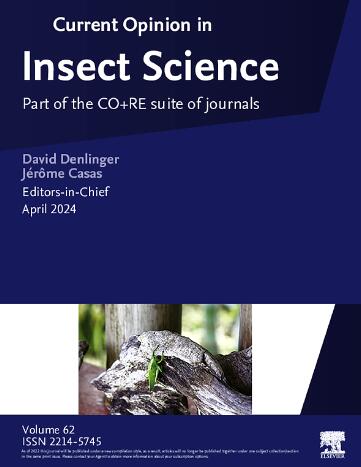Exploring interkingdom communication: the case of black soldier fly mass-rearing
IF 4.8
1区 农林科学
Q1 BIOLOGY
引用次数: 0
Abstract
Interkingdom communication through volatile organic compounds influences interactions among organisms at a level often imperceptible to humans. Artificial settings that depend on the biotechnical exploitation of biological processes, such as the rapidly expanding sector of insect farming, are strongly affected by this often-overlooked multiway communication. Here, we aim to portray the significance of interkingdom communication influencing insect behavior. We use the black soldier fly (Hermetia illucens) as a model system to introduce the necessary actions to improve our understanding of communication between insects and microbes. Successful exploration of this phenomenon could transform the bioeconomy by improving insect mass-rearing processes and enhancing insect welfare. By interlocking behavioral and molecular ecology, chemistry, microbiology, and bioinformatics, we can uncover the molecular mechanisms underlying these interactions and develop practical applications for improved industrial practices. Future work should focus on pursuing research avenues to untangle the interwoven nature of insect behavior and microbial communities.
探索跨界交流:黑兵蝇大规模饲养的案例。
通过挥发性有机化合物进行的界间交流影响着生物之间的相互作用,其程度往往是人类无法察觉的。依赖生物过程的生物技术开发的人工环境,例如迅速扩大的昆虫养殖部门,受到这种经常被忽视的多路通信的强烈影响。在这里,我们的目的是描绘跨界交流影响昆虫行为的意义。我们使用黑兵蝇(Hermetia illucens)作为模型系统来介绍必要的行动,以提高我们对昆虫和微生物之间交流的理解。对这一现象的成功探索可以通过改进昆虫的大规模饲养过程和提高昆虫的福利来改变生物经济。通过将行为和分子生态学、化学、微生物学和生物信息学联系起来,我们可以揭示这些相互作用背后的分子机制,并为改进工业实践开发实际应用。未来的工作应该集中在寻求研究途径来解开昆虫行为和微生物群落的相互交织的本质。
本文章由计算机程序翻译,如有差异,请以英文原文为准。
求助全文
约1分钟内获得全文
求助全文
来源期刊

Current opinion in insect science
BIOLOGYECOLOGYENTOMOLOGY-ECOLOGY
CiteScore
10.40
自引率
1.90%
发文量
113
期刊介绍:
Current Opinion in Insect Science is a new systematic review journal that aims to provide specialists with a unique and educational platform to keep up–to–date with the expanding volume of information published in the field of Insect Science. As this is such a broad discipline, we have determined themed sections each of which is reviewed once a year.
The following 11 areas are covered by Current Opinion in Insect Science.
-Ecology
-Insect genomics
-Global Change Biology
-Molecular Physiology (Including Immunity)
-Pests and Resistance
-Parasites, Parasitoids and Biological Control
-Behavioural Ecology
-Development and Regulation
-Social Insects
-Neuroscience
-Vectors and Medical and Veterinary Entomology
There is also a section that changes every year to reflect hot topics in the field.
Section Editors, who are major authorities in their area, are appointed by the Editors of the journal. They divide their section into a number of topics, ensuring that the field is comprehensively covered and that all issues of current importance are emphasized. Section Editors commission articles from leading scientists on each topic that they have selected and the commissioned authors write short review articles in which they present recent developments in their subject, emphasizing the aspects that, in their opinion, are most important. In addition, they provide short annotations to the papers that they consider to be most interesting from all those published in their topic over the previous year.
 求助内容:
求助内容: 应助结果提醒方式:
应助结果提醒方式:


